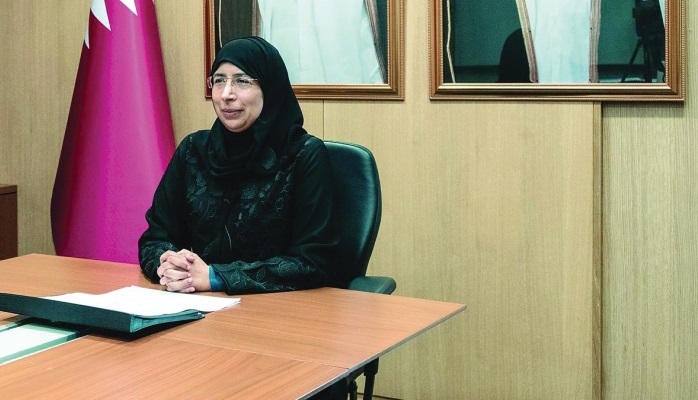SOURCE: QATAR TRIBUNE
Qatar has witnessed stability in the coronavirus (COVID-19) outbreak for several weeks, and has not faced a second wave of the virus, Minister of Public Health HE Dr Hanan Mohamed Al Kuwari has said.
The minister pointed out that there are a few cases of virus outbreaks that are mostly related to family, social gatherings, or shared places of residence, and this is controlled through effective monitoring and case tracking. However, she warned that this does not mean that “we are completely safe from the threat of a second wave.”
During her opening address at the Qatar Health 2021 Virtual Conference, Dr Al Kuwari told delegates that under the direction of His Highness the Amir of State of Qatar Sheikh Tamim bin Hamad Al Thani and Prime Minister and Minister of Interior HE Sheikh Khalid bin Khalifa bin Abdulaziz Al Thani the health sector has worked with partners across government to deliver a comprehensive strategy to protect Qatar’s population from the threat of COVID-19.
“Qatar has faced a large epidemic of COVID-19 which reached its peak on May 20. Despite the large number of cases, our health system, including hospitals and ICUs were never overwhelmed and the number of deaths remained at very low levels with a case fatality rate of 0.14 percent, one of the lowest in the world,” she said.
Dr Al Kuwari further said, “We are now witnessing a stabilisation of the disease which has been going on for several weeks: we have not seen a second wave, but a number of small outbreaks, mostly associated with family, social gatherings or shared accommodation. These were controlled through intense active surveillance and contact tracing. However, this does not mean we are free from the risk of a second wave,” she said.
“At the start of the pandemic, our government took very seriously into account the warnings of the WHO and the experience of countries such as China and Italy which were heavily hit by the new disease. We used this ‘window of opportunity’ that WHO mentioned several times and which Dr Michael Ryan, our keynote speaker (at Qatar Health 2021) repeatedly emphasised.”
Dr Al Kuwari told the attendees that from the outset it was clear that Qatar’s national response had to be carefully coordinated across government and marked by timeliness, clear lines of authority and the integration of efforts.
“Our strategy, reflected in a National Response Action Plan, was based on what we knew to be effective elsewhere and our own ability to quickly mobilise a highly capable foundation of community and hospital services. We have followed this plan through, reinforced our health intelligence efforts and continuously refined our strategy. We have relied on science and evidence and a careful balance of health and business needs,” she said.
“Very early in the course of this pandemic, we worked on rapid expansion of our acute and ICU beds knowing that 14 percent of COVID patients would require admission to hospital and five percent would need intensive care. In a record time, we opened isolation facility, acute care beds, ICU beds, transformed a general hospital into an ICU hospital, secured ventilators, protective gear, laboratory testing, redeployed hundreds of clinical staff and volunteers, and established tracing and tracking capacity.”
She said these results have been reached thanks to the talent and commitment of Qatar’s wonderful doctors and nurses and the whole healthcare workforce. It was also a testament of the high quality of the nation’s healthcare system.
“A key factor for the successful implementation of all these measures is the structure of our health system that is based on universal health coverage,” Dr Al Kuwari said.
“Treatment of patients and all health-related costs were covered by the government irrespective of nationality or social conditions. This allowed careful management and high standards of care for all our patients,” she pointed out.
“One of the main challenges we faced during the pandemic has been to ensure continuity of treatment for patients with chronic diseases. We took advantage of digital communications, to enable remote consultations, home care and medication home delivery to be swiftly and efficiently established.”
Dr Al Kuwari said the gigantic effort to confront COVID-19 could not have been done without the support of the people of Qatar.
“We could never have controlled the epidemic without the help and support of the people of Qatar who observed rules on masks wearing and hand hygiene and limit public gathering. Consequently, we never reached a full lockdown,” she noted.
Dr Al Kuwari said 2021 and beyond presented new challenges that required the same focus, innovation and dedication.
“Throughout 2020 our approach has been underpinned by three important elements planning, commitment and resilience. And as we look forward to 2021 we are going to need the same planning, commitment and resilience we have shown over the last year,” Dr Al Kuwari said.
“Our primary COVID-19 focus during the year ahead will be to roll out our mass vaccination strategy and to continue to support the global vaccination drive through our support to WHO.”
Dr Al Kuwari said that the pandemic has changed “our lives and a huge challenge to running mass gatherings”.
She said Qatar’s response to COVID-19 has made use of the knowledge and experience freely shared by other countries and international organisations.
At the same time, Qatar contributed to global knowledge with a number of original research papers and reports several of these presented at Qatar Health 2021.
“The experience we learnt by hosting many sports and other mass gathering events in 2020 during the pandemic has put us in a strong position to host safely the numerous events in 2021 that are a precursor to the 2022 FIFA World Cup in Qatar,” Dr Al Kuwari added.
“Qatar, in collaboration with its local and international partners, is in a wonderful position to set a new standard in hosting safe and healthy mass gathering events. I invite you to learn, share and put in practice what you learn over the next few days.”
Qatar Health 2021 is a three-day programme of interactive and immersive sessions and a virtual exhibition.
The keynote speaker for the event was Dr Michael Ryan, the World Health Organization’s Director of Health Emergencies Programme and considered one of the pre-eminent experts throughout the COVID-19 pandemic.
The event hosted a unique and fully immersive exhibition where attendees could visit virtual booths by partners and sponsors of Qatar Health 2021. The Ministry of Public Health, HMC and Primary Health Care Corporation had three joint booths at the virtual exhibition focusing on the healthcare sector’s response to COVID-19, innovation across the healthcare system and healthcare preparations for FIFA World Cup 2022. Sponsors for Qatar Health 2021 included Qatar Biobank and Aamal Medical.
With more than 5,000 registered attendees, Qatar Health 2021 Pandemic Mitigation: Best Practice for Disaster Medicine, Mass Gatherings and Trauma Systems was a collaborative effort between Hamad Medical Corporation (HMC) and the Ministry of Public Health in preparation for the 2022 FIFA World Cup.







Leave a Comment